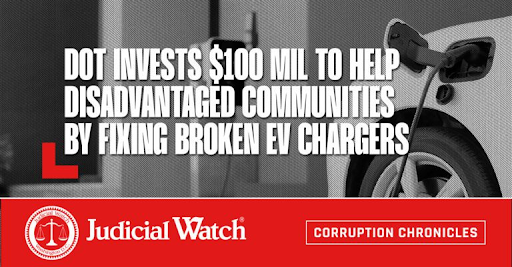

Besides subsidizing the electric vehicle (EV) industry with a staggering $15.5 billion, the Biden administration is investing an additional $100 million in federal funding to prioritize the repair and replacement of EV charging stations throughout the U.S. The venture will “ensure disadvantaged communities benefit from upgraded charging infrastructure,” according to the Department of Transportation (DOT), which is doling out the money. The costly EV charger project is part of the administration’s Justice40 Initiative which requires 40% of all federal government investments to flow to “disadvantaged communities that are marginalized, underserved, and overburdened with pollution.” The president signed an executive order within days of taking office to allocate unprecedented public funds to poor minority communities in the name of environmental justice.
The multi-million-dollar EV charger restoration project will operate under a Justice40 initiative known as National Electric Vehicle Infrastructure (NEVI) Formula Program that provides states with money to strategically deploy charging stations and establish an interconnected network to facilitate data collection, access and reliability. “The Biden-Harris Administration has set a goal of building a convenient, affordable, reliable, equitable, and Made-in-America electric vehicle (EV) charging network along the Nation’s highways and within our communities,” according to the grant announcement issued this month by the DOT. Because it is a Justice40 program the feds will use a White House Climate and Economic Justice Screening Tool to track how assisted chargers aid needy communities. “Recipients of awards under this program can also use the tool to ensure disadvantaged communities benefit from upgraded charging infrastructure,” the grant document states, adding that “the tool can be used to help prioritize and sequence projects to maximize benefits to disadvantaged communities.”
The White House launched the Climate and Economic Justice Screening Tool in response to the president’s January 2021 order to tackle the “climate crisis at home and abroad.” The directive includes an extensive section dedicated to securing environmental justice for disadvantaged, historically marginalized and overburdened communities, by among other things, creating a White House Environmental Justice Interagency Council consisting of top government leaders. The heads of key federal agencies—including the attorney general, secretaries of defense, labor, transportation and energy—were essentially ordered to address environmental justice in minority and low-income populations. “Agencies shall make achieving environmental justice part of their missions by developing programs, policies, and activities to address the disproportionately high and adverse human health, environmental, climate-related and other cumulative impacts on disadvantaged communities, as well as the accompanying economic challenges of such impacts,” according to Biden’s order.
It is not clear what the EV ownership rate is in marginalized or overburdened communities or the demand for chargers because the government has failed to provide that information. However, the administration does reveal that as of this month, 6,261 public charging ports out of 151,506 nationwide were identified as being temporarily unavailable. California has the largest number (1,707) of broken chargers followed by New York (541), Texas (379), Florida (356) and Massachusetts (265). The objective of the administration’s $100 million investment is to enhance and maintain the reliability of the charging network by focusing on the repair or replacement of existing chargers that are currently non-operational, a goal it asserts “will be aligned with the Biden-Harris Administration’s Justice40 Initiative.” The connection is not fully explained.
Just weeks before the charger allotment the administration announced that, as part of the president’s Investing in America agenda, the Department of Energy is disbursing $15.5 billion to “support a strong and just transition to electric vehicles.” The money will focus on “retooling existing factories for the transition to electric vehicles,” according to the agency. Jennifer Granholm, Biden’s energy secretary, claims the funding shows that the president “understands that building the cars of the future also necessitates helping the communities challenged by the transition away from the internal combustion engine.”





